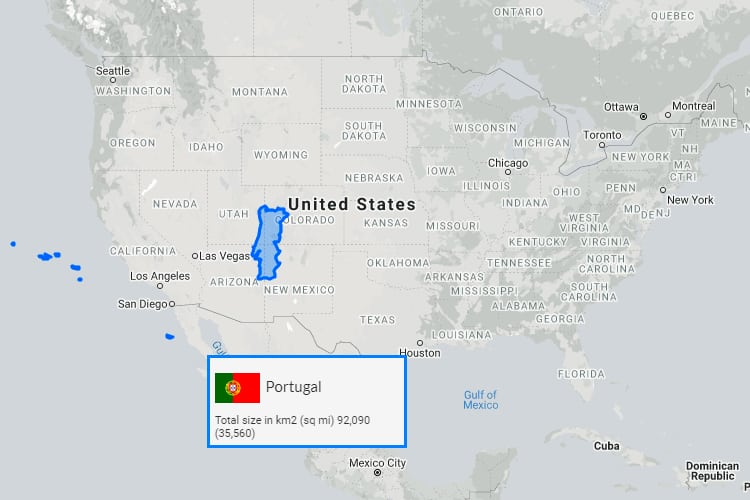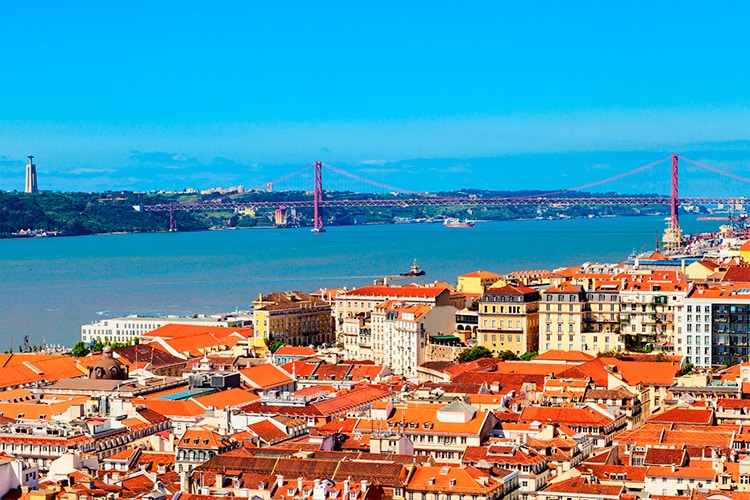Last Updated on August 7, 2025 by Maryam Siddiqui
Have you ever thought about living in a small European country with safety, quality of life, and low cost? Welcome to Portugal, the new darling of American expats. In the article, find out if Portugal really is the California of Europe and see what you have to do to move to Portugal from the United States. Good reading!
Move to Portugal from the United States: what Americans need to know
First of all, know that in order for Americans to move to Portugal, they will need to obtain a visa and a Portuguese residence permit.
That is, unless you also have citizenship in some European Union country or want to benefit from the Portugal Golden Visa Program.
But even if you don’t, you’ll be glad to know the following: all foreign nationals who have legally lived in Portugal for more than 5 years is entitled to apply for Portugal citizenship!
The advantages of having a Portuguese passport are many, you can benefit from the protection of the European Union and much more.
How can Americans obtain a visa to live in Portugal?
In order to live in Portugal, an American citizen needs to obtain a Residence Permit. Usually, the way to obtain it is through a Residence Visa process. The Portuguese government plays a significant role in facilitating the visa application process, offering various visa options to attract expats.

Take a look at the most common Visas to Portugal required by Americans:
- D1 visa: Subordinated work visa;
- D2 visa: Independent professional activity or migrant entrepreneurs;
- D3 visa: Teaching purposes, highly qualified activity visa;
- D4 visa: Study, higher education, volunteer visa;
- D6 visa: Family reunification;
- D7 visa: Passive income and retirement visa.
To apply for your residency visa, you must contact the representatives of the local Portuguese consulate in the United States. In other words, VFS Global, a visa outsourcing company.
When applying for a visa to Portugal, the process starts online, by obtaining a Portuguese Tax Number (NIF Number). However, at the final stage, an interview will also be required at one of the application centers (VFS Global) in the US, such as those located in New York, San Francisco, or Washington DC. Additionally, opening a Portuguese bank account is necessary for financial transactions like signing leases and purchasing property.
For those planning to move to Portugal from the United States, there’s also an exciting opportunity to obtain a Residence Permit without needing a visa first. This is possible through the Residence Permit for Investment Activity, widely known as the Golden Visa. While it does have specific eligibility and investment requirements, it remains a valuable pathway for qualified individuals seeking a fast track to residency in Portugal.
The process of obtaining a Portugal Golden Visa, however, is not fully conducted in the United States. The Golden Visa Program process also requires a large investment, like investment funds, or company creation, which must be requested from the Immigration Services in Portugal.
After 5 years of maintaining the investment, you’re eligible to apply for the Passport and become a Portuguese citizen.
- You will also like to read: Portugal Golden Visa Updates: New Investments in 2024
Deciding where to live in Portugal: Best regions and cost of living
Portugal is a small country when compared to the United States of America. See its true size on the map below.
But that doesn’t mean it lacks diversity. In fact, this small country often surprises both visitors and residents with its rich variety of landscapes, Portuguese culture, and unique customs.
For anyone considering moving to Portugal from the United States, it’s worth knowing that Portuguese citizens enjoy a range of benefits, including access to public healthcare and the ability to live and work across the EU. These perks can definitely influence your decision on where to settle.

And speaking of settling, choosing where to live in Portugal can be a bit tricky simply because there are so many great options! Here are a few of the best cities for expats to consider:
- Lisbon: the capital and largest city, located centrally;
- Porto: Portugal’s second-biggest city and the cultural hub of the north;;
- Lagos: a charming town in the sunny Algarve region;
- Coimbra: a historic city near the Silver Coast, known for its university;
- Braga: a vibrant city in the north, full of tradition;
- Setúbal: a beautiful coastal city just 40 minutes south of Lisbon;
- Funchal: the capital of the scenic Madeira Island;
It’s nearly impossible to crown one city as “the best.” Your choice really depends on your lifestyle and preferences. The good news? Portugal truly has something for everyone.
A great tip is to explore your options in person, go on a scouting trip before making the big move. And if you’re sure about relocating permanently, this is also a great time to start learning Portuguese. It’ll go a long way in helping you feel at home!.
Think about joining the labor market in Portugal
For those Americans who are interested in entering the labor market in Portugal, some tips. Portugal has one of the lowest average salaries compared to other European countries, €820 monthly (in 2024). So you should expect to have a much different way of life here. Especially because you may be expected to be fluent in Portuguese language.
As you can read in our article on average wages in Portugal, making money in Portugal isn’t that easy. Portugal is a place to live well, but it is not suitable for those who want to create wealth. Perhaps for that, you should stay in America.
What most American expats who work in Portugal do is keep their remote job from the US. That means you get to keep your salary and get to live in a place with a low cost of living. Digital nomads who live in Portugal get to experience an amazing lifestyle, in the most beautiful locations.
Consider the cost of living
Everyone knows that the cost of living in Portugal is much lower than in the United States. See the table below for an estimate of monthly spending:
| Expenses | Costs |
|---|---|
| A single person estimated monthly costs (without rent) | €687 |
| Family of four estimated monthly costs (without rent) | €2,431 |
| 1-bedroom apartment rental in the city center | €923 |
| 3-bedroom apartment rental in the city center | €1,576 |
Data is from Numbeo (as of July 2025)
To make it even clearer, Numbeo shows that the cost of living in Portugal is, on average, 41.88% lower than in the United States, while rent is 57.5% lower.
And of course, it is worth remembering that the cost of living can vary a lot depending on the region, neighborhood, and even tastes and spending habits.
- You will also like to read Is Portugal the California of Europe? See similarities and differences
Let’s Move to Europe
With Viv Europe your plans for Europe will come to a reality
What about taxes?
One of the most common questions expats make about the relocation process is if you have to pay taxes in Portugal or in the US. And the answer varies greatly depending on the case which should really be analyzed by a lawyer or accountant.
Luckily we have already answered the most asked questions about taxes in Portugal in another article. It can be quite a complex matter, but you must not move here before taking this into consideration.
- Do you know about the Passive Income Visa? Explore everything you need to know about the D7 Passive Income Visa (also known as the Retirement Visa).
Finding a new home
Now that you have chosen to move to Portugal from the United States, it remains to be seen exactly where you will live.
An apartment or house? In the center or in the countryside? Buying or renting a property?

The decision to buy or rent your house in Portugal is your own. But both require in-depth research beforehand and that you learn about Portugal’s real estate market. Check out the table below for some values:
| Region in Portugal | The average purchase price for a 100 m² property | Average monthly rental price for a 50 m² apartment |
|---|---|---|
| Lisbon | €407,600 | €985 |
| Porto | €265,600 | €785 |
| Algarve | €371,200 | €780 |
| Madeira | €343,900 | €715 |
The table data was taken from Idealista (as of July 2025).
Also, consider reading our article Top real estate websites in Portugal and tips for buying properties online to help you through this step.
Healthcare and Education in Portugal
Understanding the Healthcare System
Portugal’s healthcare system is renowned for its quality and accessibility, offering universal coverage to all residents, including American expats with legal residency status.
The public healthcare system, known as the Serviço Nacional de Saúde (SNS), provides comprehensive services such as doctor visits, hospital stays, and prescriptions. This ensures that everyone, regardless of their financial situation, has access to essential medical care.
To access the public healthcare system, expats must register with their local health center (Centro de Saúde) and obtain a health card (Cartão do Utente). This card is your gateway to receiving medical care at public hospitals and health centers.
However, many expats also opt for private health insurance to enjoy additional benefits like shorter wait times and more personalized care. Private healthcare providers in Portugal are known for their high-quality services, making this a popular choice for those who prefer a bit more flexibility and convenience.
Read Also: Healthcare in Portugal: A guide to the Public Health System
Exploring Educational Opportunities
Portugal’s education system is highly regarded, with a strong emphasis on literacy and academic achievement. For American families moving to Portugal, there are several schooling options to consider. Public education is free for residents and citizens up to the age of 18, providing a solid foundation for children.
For those seeking an international curriculum, Portugal boasts a number of excellent international schools. These schools offer a range of curricula, including the International Baccalaureate (IB) and the British National Curriculum, catering specifically to expat families.
International schools in Portugal are known for their experienced teachers, modern facilities, and a familiar educational environment that prepares students for higher education and future careers. Tuition for these schools typically starts at around €6,000 (approximately $6,480) annually, making them a viable option for many expat families.
Culture and Lifestyle in Portugal
Cultural Things to Know Before Moving
Portugal is a country rich in cultural heritage, shaped by its history, traditions, and values. For those moving to Portugal from the United States, understanding these cultural nuances can greatly enhance your experience as an American expat and help you integrate more smoothly into Portuguese society.
One of the most profound aspects of Portuguese culture is the concept of “saudade”, a deep emotional state of melancholic nostalgia. This sentiment is often expressed in music, literature, and art, and is a fundamental part of the Portuguese identity. Embracing this concept can provide a deeper appreciation of the local culture and its artistic expressions.
Family and social relationships are also central to Portuguese culture. Mealtimes are often seen as opportunities to bond with family and friends, and social gatherings are frequent and lively. This emphasis on community and togetherness can be a delightful change for many expats, offering a warm and welcoming environment.
Portugal also has a strong tradition of festivals and celebrations, such as the Festa de Santo António in Lisbon and the Festa de São João in Porto. These events showcase the country’s vibrant culture and offer a glimpse into its rich history and traditions. Participating in these festivals can be a wonderful way to immerse yourself in Portuguese culture and build connections with the local community.
By understanding and embracing these cultural aspects, American expats can build stronger relationships with the local community and enjoy a more authentic experience while living in Portugal.
Finally moving to Portugal
Once all the visa bureaucracy is done and you know exactly where you’re going to live, it’s time to move!
It’s time to say goodbye to friends and family. You may be leaving the United States, but Portugal from the United States is just a flight away, and your loved ones will still be able to visit you whenever they like!
But before you buy your plane ticket, it’s important to plan what personal items you want to bring along.
Taking your belongings to Portugal can be expensive, so not everything is worth transporting. You can always buy new furniture or clothes once you arrive. After all, you’re starting fresh in Europe!
As for pets, that’s essential! Bringing your pet to Portugal is absolutely possible, but it does require some paperwork and planning (like most things in Portugal). Be sure to prepare properly and notify the authorities in advance to ensure a smooth transition.
- Want to know about private health insurance? Check out our complete article: Health Insurance in Portugal: Top options for you.
Why are American expats moving to Portugal?
The reasons Americans move to Portugal are similar to those leading the British, South Africans, and many other nationalities.
Portugal has been so popular in recent years due to many reasons, such as:
- Spectacular landscapes;
- Safety and stability;
- Idyllic climate;
- Traditional cuisine;
- Standard of living;
- Portuguese citizenship;
- Cost of living.
Furthermore, the country is one of the most welcoming and with the simplest visa procedures in Europe. Real Estate investors and, more recently, Cryptocurrency traders love Portugal.
When are you moving to Portugal from the United States?
Do you already know if Portugal is the place for your next adventure? Join thousands of other American expats in Portugal on our Facebook Group: All About Portugal For Expats.
Moving to Portugal from the United States is a lot of work, but it is definitely worth it.
Maybe we can help you get there faster and easier. If you want help relocating to Portugal, make sure to contact Viv Europe’s professional team. Let’s turn your Portugal dream into a reality.





